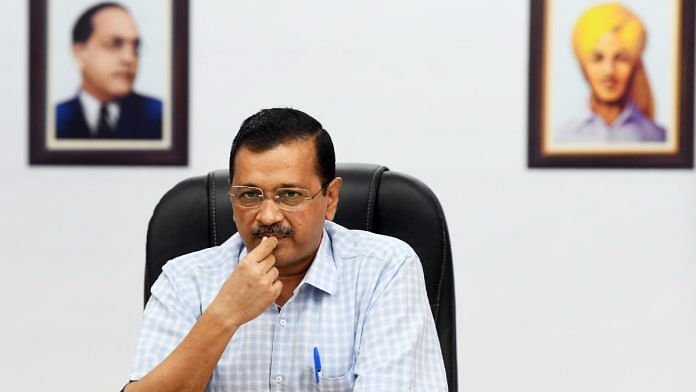The Aam Aadmi Party seems to be in disarray. Despite sharing identical views on ideological issues such as the Ram Mandir, Article 370, the Economically Weaker Section or EWS quota, and the demonisation of Tablighi Jamaat during the Covid-19 pandemic, why is the Bharatiya Janata Party trying to destroy the AAP? Delhi Chief Minister Arvind Kejriwal flaunts his religiosity quite overtly. At the same time, why is the BJP not acting aggressively, or at least decisively, against its ideological foes, including the All India Majlis-e-Ittehadul Muslimeen, Dravida Munnetra Kazhagam, Rashtriya Janata Dal, or Communist Party of India (Marxist)? Why don’t we see the same vengeance by the BJP against these parties?
Even in the case of the Congress, the BJP government has not put any prominent leader behind bars other than P Chidambaram. But I see Chidambaram’s case as a personal score-settling by Union Minister Amit Shah rather than a political act. Those who know will understand what I am inferring.
Putting leaders under legal scrutiny and sending them to jail to settle political scores is not unique to any political party or government in India. At different points in time, leaders such as Jayaprakash Narayan, Indira Gandhi, Charan Singh, Atal Bihari Vajpayee, J Jayalalithaa, M Karunanidhi, Sharad Yadav, Lalu Prasad Yadav, Amit Shah, Parkash Singh Badal, and Shibu Soren were sent to jail for various reasons. The reasons vary from sedition to corruption charges or some other sections of the Indian Penal Code (IPC) or some special Act. But the underlying reason most of the time was political or personal vendetta. In the case of AAP leaders, the reason for arrest is corruption.
In India, and perhaps in other countries as well, contesting an election is a costly business, and parties and leaders accumulate money for this purpose too. In most cases, the methods for accumulating money are shoddy or at least suspicious. It’s true for most of the political parties. So when a government takes action against a political party or leader on charges of corruption, it may be right, but the choice in acting against a specific party or leader is always political.
Also read: Kejriwal arrest brought focus back on corruption & moved big electoral bonds story off-stage
Why is BJP going after AAP?
The BJP is going after the AAP not because it is ideologically opposed to it but because it is ideologically close to it. That makes it difficult for the two parties to operate, as they have the same arena and voters with similar choices. If you just remove the Savarkarite core from the BJP, it looks quite similar to the AAP. Or if you add aggressive Hindu-Muslim binary politics to the AAP (the soft part it always has), it will look like the BJP.
That also makes it possible and easy for the voters of these two parties to switch sides. We have seen that in Delhi, where the voters voted overwhelmingly for the BJP in the 2014 and 2019 Lok Sabha elections—the party won all seven seats. The same set of voters voted for the AAP en bloc in the 2015 and 2020 assembly elections, and the AAP won 67 and 62 seats in the house of 70 MLAs.
It also implies that the DMK, the Left, or the AIMIM is not a threat to the BJP. Even geographically, their areas of influence are different. One can’t say the same thing about the AAP. The BJP and AAP are both predominantly North Indian parties and both have support bases in urban areas. The AAP is quite tiny in comparison to the BJP, but it may not remain so. That’s the reason that when it faltered in its Delhi Excise Policy and took it back, the BJP saw an entry point and it pounced upon it.
Ideological proximity can act in either way. It can bring parties together and can be a glue to form alliances, but it can also lead to competition in the extreme sense, envy, and jealousy. As in the case of the BJP and the Shiv Sena—two similar parties saw a long period of comradeship. The opposite is happening in the case of the AAP and BJP.
Thus, a party that supported the abrogation of Article 370 during Lok Sabha and Rajya Sabha voting, which sends Tirth Yatris to Ayodhya, which welcomed the Supreme Court judgment on Ayodhya, and which has been organising religious functions regularly, and on top of all things, like the BJP, held the Tablighi Jamaat responsible for the spread of Covid-19 in Delhi, finds itself in the firing line of the Union government led by the BJP.
This is how I would like to theorise it: Jealousy between political parties arises from close competition and similarities in their goals, strategies, or voter bases. It’s a reaction to perceived threats to a party’s influence, resources, or support, typically surfacing when parties operate within similar political spaces or compete for the same segments of the electorate.
This will also decode the puzzle of why the Congress ensured that Lalu Prasad should never return to electoral politics, why the Manmohan Singh government put DMK minister A Raja and DMK MP Kanimozhi in jail, or why Rahul Gandhi led the agitation against the Mayawati-led UP government at Bhatta Parsaul. The Congress perceived that these parties had stolen its support base and to reclaim that base, these parties must be finished.
Dilip Mandal is the former managing editor of India Today Hindi Magazine, and has authored books on media and sociology. He tweets @Profdilipmandal. Views are personal.
(Edited by Humra Laeeq)




Aye. All are similar socialist parties, only the degree of socialism varies. Left, right, or centre, all swear by competitive socialism.